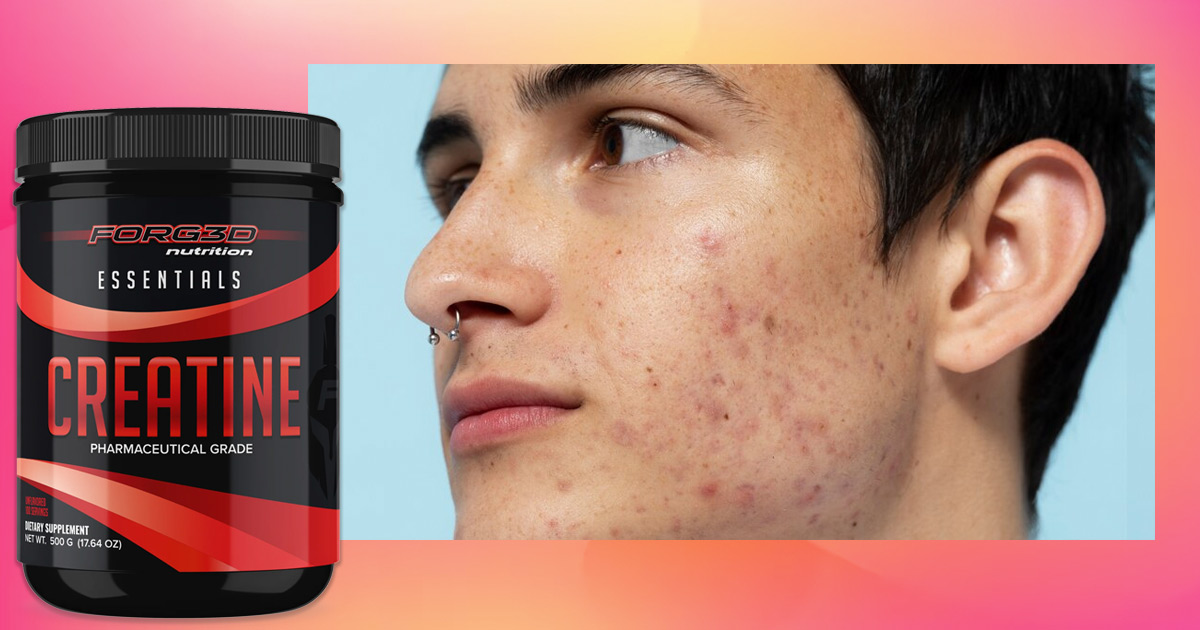Can Creatine Give You Acne? Let’s Settle the Debate

Creatine has become super popular among gym-goers and athletes for building muscle and boosting performance, but there’s a question that keeps popping up—is it causing breakouts? If you’ve started seeing acne after adding creatine to your routine, you might be wondering if the supplement is to blame.
What Is Creatine and Why Use It?
Creatine is a natural substance your body makes in the liver, kidneys, and pancreas. It’s also in foods like red meat and seafood. Most of it is stored in your muscles, where it helps produce energy during intense workouts. Studies have shown that creatine can increase strength, endurance, and muscle growth. For those looking to lift heavier, run faster, or build muscle more efficiently, creatine supplements are a no-brainer.
The most common form is creatine monohydrate, which is safe and effective when taken as directed. Beyond athletic performance, studies suggest it may even support brain health and recovery from injuries. Pretty cool, right?
But as much as creatine can be a game-changer in the gym, some users have concerns about side effects like acne. Is this really something to worry about?
Can Creatine Make You Break Out?
Honestly, creatine doesn’t directly cause acne. There’s no scientific proof linking creatine itself to acne. However, it’s what happens around your routine that might lead to breakouts.
For starters, creatine may slightly impact your hormones, like increasing insulin-like growth factor 1 (IGF-1). Higher IGF-1 levels can sometimes boost oil production in your skin, which might clog pores and lead to acne. But this connection isn’t strong or consistent in studies, so it’s not a definite cause.
What’s more likely is that changes in your lifestyle while using creatine play a bigger role. Many people taking creatine push themselves harder in the gym, which means more sweating. If you’re not washing off that sweat soon after, dirt and bacteria can stick around and trigger acne.
Diet can also be a factor. When people take creatine, they often bump up their protein intake. If whey protein is part of your diet, that could be contributing to breakouts as well since it’s been known to cause acne in some people.
How to Stop Breakouts While Taking Creatine
If you’re noticing acne and suspect creatine might have something to do with it, there are simple steps you can take to protect your skin:
1. Wash Up Post-Workout
Sweaty skin is a magnet for dirt and bacteria. Make it a priority to shower and wash your face as soon as you finish your gym session. Use a gentle, non-oily cleanser to help clear out your pores.
2. Look at Your Diet
Your protein shakes might be doing more than fueling your muscles. Some people find that whey protein contributes to breakouts. If that sounds like you, consider switching to plant-based protein alternatives like pea or rice protein.
3. Stay Hydrated
Drinking enough water helps keep your skin hydrated and balanced. When your skin’s moisture levels are in check, it’s less likely to overproduce oil, which can lead to clogged pores.
4. Use Good Skincare Products
Make sure the products you’re using on your skin, like moisturizers or sunscreens, are labeled “non-comedogenic.” That means they’re designed not to block your pores.
5. Wipe Down Equipment
Shared gym equipment can be another reason your skin is breaking out. Always wipe down benches and machines before using them to minimize bacteria transferring to your skin.
Why Does Creatine Get Blamed for Acne?
Creatine tends to get blamed for a lot of issues because people confuse it with other substances, like anabolic steroids. Steroids can wreak havoc on your skin because they directly affect hormone levels, causing acne. But creatine? It’s just a naturally occurring compound that doesn’t mess with your hormones on that level.
The confusion might also come from timing. If you start taking creatine and simultaneously ramp up your workouts or change your diet, your skin could react to those changes—not the creatine itself.
Does Creatine Help Acne?
Now, here’s an interesting twist. While it’s unlikely that creatine will “clear” your acne, some research suggests it can improve skin health in other ways. Topical creatine, for example, has been shown to boost skin elasticity and reduce wrinkles. While this doesn’t help with acne directly, it’s worth noting that creatine has benefits beyond building muscle.
Creatine and Acne: Is Creatine Worth It?
Figuring out if creatine is for you really comes down to your goals. If you’re focused on building muscle, getting stronger, or leveling up your workouts, creatine could be a great addition. It’s one of the most well-studied supplements out there, and it genuinely works for a lot of people. Plus, if acne isn’t something you normally deal with, you probably won’t run into issues.
But if you’ve noticed your skin breaking out and it’s bothering you, it might be worth taking a break from creatine to see if it’s the culprit. Sometimes it’s not even the creatine. It could be things like your post-gym hygiene or changes to your diet. And if the acne sticks around after stopping, it’s likely something else causing it.
At the end of the day, it’s all about what works best for you. You don’t have to pick between clear skin and making gains. Test it out, pay attention to how your body reacts, and go with what fits your goals and makes you feel good about yourself.
